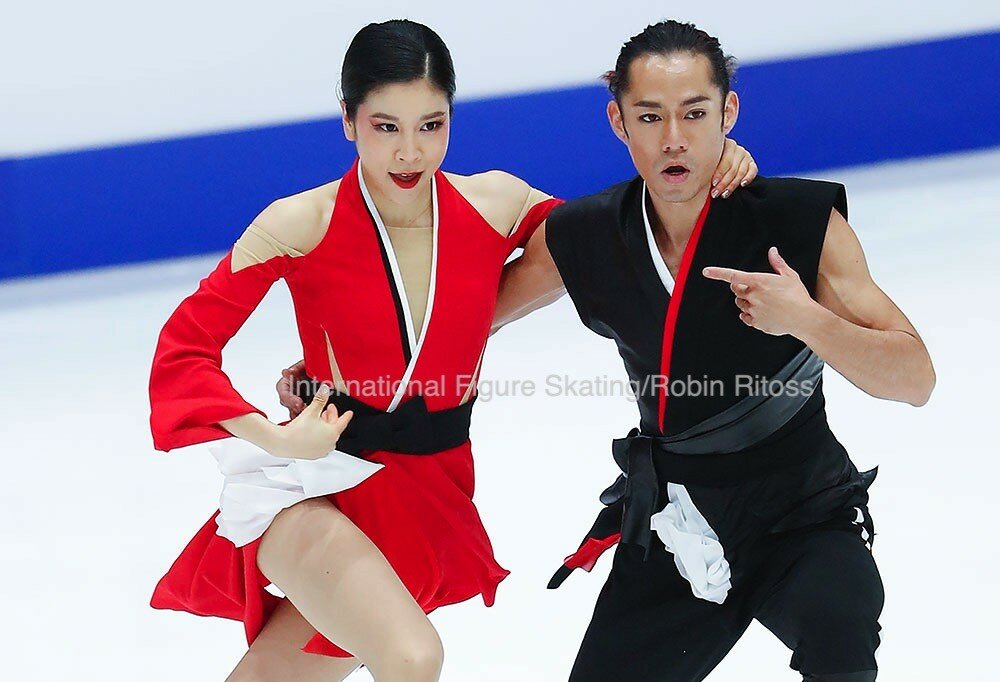
When Daisuke Takahashi called an end to a 12-year singles career in September 2019, he did something no one expected. With no thought of retiring, the then 33-year-old already had a plan in place to switch to ice dance and partner with Kana Muramoto.
Though Muramoto, a former singles skater who had herself turned to ice dance in 2014, had solid experience in the discipline, Takahashi had none. The duo moved to Florida to work with Marina Zoueva and Takahashi spent the next two years working on the basics of ice dance, learning lifts, twizzles and skating with a partner.
Though they were a little rough around the edges in their first outings, two years into the partnership the performance aspect, execution and presentation of their programs began to improve with each competition.
Muramoto and Takahashi first found success at a local competition in September 2021, with YouTube videos of their free dance performance at this small event going viral, garnering more than a million combined views.
In November, the duo competed on the Grand Prix stage at NHK Trophy in Japan, finishing sixth in a field that included the Russian team of Victoria Sinitsina and Nikita Katsalapov, the 2021 World champions, and Madison Chock and Evan Bates of the U.S. The following week, they finished second at Warsaw Trophy behind a young Russian team and ahead of Caroline Green and Michael Parsons of the U.S.
With the goal of earning the sole ice dance berth Japan had available at the 2022 Olympic Winter Games, Muramoto and Takahashi returned to their homeland for the national championships in late December. Due to the restrictions on entering the country, Zoueva was unable to accompany them.
Things did not go as they had hoped at the All Japan Championships. Following an unexpected fall in the rhythm dance, the duo sat in second and though they won the free dance, it was not enough to catapult them over the leaders. Muramoto and Takahashi finished in second place overall. It was a result that surprised many who watched the competition.
The Japanese federation subsequently assigned Muramoto and Takahashi to the 2022 Four Continents and World Championships.
The team returned to Florida on Jan. 2 and with just two weeks until the next competition, worked on improving their technique and elements. “Between nationals and Four Continents, we focused mainly on the rhythm dance and didn’t work so much on the free dance,” Muramoto explained. “We wanted to change a lot of things, but we didn’t have much time, so we worked on the quality and on our confidence. We wanted to take another step forward and feel more confident in our own skating.”
The Four Continents Championships, which took place in Tallinn, Estonia, in mid-January, was a familiar one for Takahashi. As a singles skater, he competed at this event seven times, winning bronze in 2005, gold in 2008 and 2011, and silver in 2012.
“It had been nine years since the last time I was at Four Continents. It felt very nostalgic,” Takahashi admitted. “It was my first time as an ice dancer, so it was something fresh and new. I would never have thought of coming back and competing as an ice dancer, so I am very glad and thankful.”
Muramoto, who competed at her first ice dance competition in Tallinn with a former partner, Hiroichi Noguchi in 2014, expressed the same nostalgic sentiment. “It feels very interesting that I’m back here with Daisuke and it’s our first Championship together,” she said. “It’s a big opportunity to compete with the other skaters. It’s very special for us and we are proud to be here.”
Performing the rhythm dance to “Sōran Bushi” (a traditional Japanese sea shanty) performed by Maïa Barouh, Muramoto tripped on Takahashi’s blade at the beginning of the routine and tumbled to the ice. The error left them sitting in second heading into the free.
“We had a big mistake at the beginning. We both had the wrong timing, but we’re really happy with how we performed after the mistake,” said Muramoto. “We never fall and never made that error in practice. At nationals we kind of had the same experience, so today we were calm after the big fall. You have to keep going; the music continues, and no one is going to stop you. We had to keep a clear mind, to focus on what was coming next. After we finished, we looked at our results and saw that we can compete on an international level and that gave us confidence. We just need more competition experience.”
The duo flowed through their free dance set to “La Bayadère,” by Ludwig Minkus, making no mistakes. However, the judging panel in Tallinn did not quite view the performance the same way as the tens of thousands of people who watched it online. Muramoto and Takahashi scored a solid 61.54 for technical content, but the low presentation mark of 47.94 was completely bewildering.
Nonetheless, the Japanese duo finished in second place overall behind Green and Parsons, the team they defeated two months earlier in Poland, writing a small piece of history as the first ice dance team from their nation to capture a silver medal at a Championships (Muramoto had previously won bronze in 2018 with her former partner Chris Reed).
“We are very happy with our second place medal,” said Muramoto, 28. “I think we wrote another piece of history. For me, I’m just really happy. It feels so special to be here with Daisuke, and to see him perform as an ice dancer is just amazing. It is still the beginning for us, so it feels very special right now. It was our first Championship and our second season together. I think what we achieved coming here is a really big thing. At nationals, it wasn’t the result we hoped for and we were a bit down, but we wanted to keep going, take a step forward and believe, so we really worked on building our confidence and the quality of each element.
“Marina and our team prepared us to do our best and always put us in a great mindset. Of course, we wanted to be on the podium, but our goal was also to do our best. So it wasn’t that stressful.”
Takahashi, 35, saw it slightly differently, noting with a laugh that it was a little stressful for him, and that he was slightly disappointed with his own performance. “Even though we did not make any big mistakes, some parts were a bit messy. I feel like I didn’t give 100 percent, but overall I think we did a good job. We did make mistakes but that only happens in a competition like this, so this was a very important learning experience for us — part of the learning process. Some things went well, and some things didn’t, but I think it gave us more confidence.
“After I turned to ice dance, COVID started and we had hardly any chance to compete, especially outside of Japan. So this was a very precious opportunity to compete with all the international skaters, and we felt very honored to be sent to this Championship. There is joy in becoming a silver medalist, but there is frustration, too. Last year I wouldn’t have felt this way, but this season I was able to gain a lot of experience. That’s not only because of Kana, but also Marina and many other people that supported us.
“A podium finish was beyond my imagination last season, so I’m very happy to be on the podium for the first time at a Championships (as an ice dancer). I can hardly put my joy into words. It all feels so sudden. We want to achieve our best possible result this season by delivering a perfect performance. That will be our goal for the World Championships.”
“Even though we are only in our second season, it was important for us at this international Championship to see how we performed,” Muramoto added. “We can fight with the whole world, and I admire Daisuke a lot for that. It feels weird because on one hand I’m happy to be on the podium, but on the other hand frustrated because of the mistakes. We got a very good result and that has given us a lot of confidence for the World Championships. We want to be confident and train well so we can keep up with the best teams. We feel we can do much more — we definitely need to improve our levels.”
Finding the right music for the rhythm dance proved challenging for many teams this season, and Muramoto and Takahashi were no exception. “As a team we came up with the idea of skating a Japanese program since it’s an Olympic year. We hoped to represent Japan with a unique street dance,” Muramoto explained. “The first part is very traditional Japanese music portraying fisherman or the sea, working hard to catch the dream or the fish.
“The second half is Japanese hip hop traditional koto (a Japanese stringed instrument). It was hard for us to find the right music to match the first Midnight Blues (set pattern), but we found the second hip-hop piece, and everything matched well. We are portraying how we are evolving. The second half represents many kinds of Japanese aspects. It’s a fun and unique program for us to skate to.”
Following Four Continents, Muramoto and Takahashi immediately turned their attention to preparing for the World Championships and planned to work on all elements in their programs — as well as their confidence. “I feel we have so much potential to grow with our team in Florida and we basically need to be prepared for everything,” said Muramoto. “Building our confidence, being confident in our skating, and knowing that we can compete with the world’s top teams.”
What lies beyond that competition at the end of March is still an unknown. “Right now we are focusing on Worlds and after that we need to really take the time and think about what we are going to do,” said Takahashi. “If we are to continue it is a major commitment and we have to make sure we are on the same page and have the same goals. Ice dance is something that involves two people, so to continue … the motivation itself will not do. We need to take time to decide what to do.
“If that motivation continues to develop inside us and we want to see different views from different pictures and skate different programs … I can’t guarantee anything yet, but all these small motivations are kind of developing inside us now.”
Whatever the duo decides, their presence in the world of ice dance has already had an impact in their homeland. In what would normally be an almost empty arena, the ice dance event at the All Japan Championships in December was at capacity with fans eager to see this dynamic duo perform live.
The success that Muramoto and Takahashi have so far enjoyed has been a catalyst for young Japanese skaters to consider the discipline. “At nationals the number of people who came to watch ice dance was just amazing. I was very surprised,” said Muramoto. “There are now a lot of novice and junior teams, so what we have accomplished has had some effect on ice dance in Japan. I think a good result will bring more attention to the sport and we were happy to be given that opportunity. I think our result at Four Continents was big news and I am happy that we are in this position.”
“We are not yet exactly clear about what we will be doing in the future, but we are starting to feel motivated. We have been in second place all season — like silver collectors — but we have the motivation to get gold and we want to stand in the middle of the podium.”
RELATED CONTENT:
2022 WORLD CHAMPIONSHIPS
2022 FOUR CONTINENTS RESULTS





